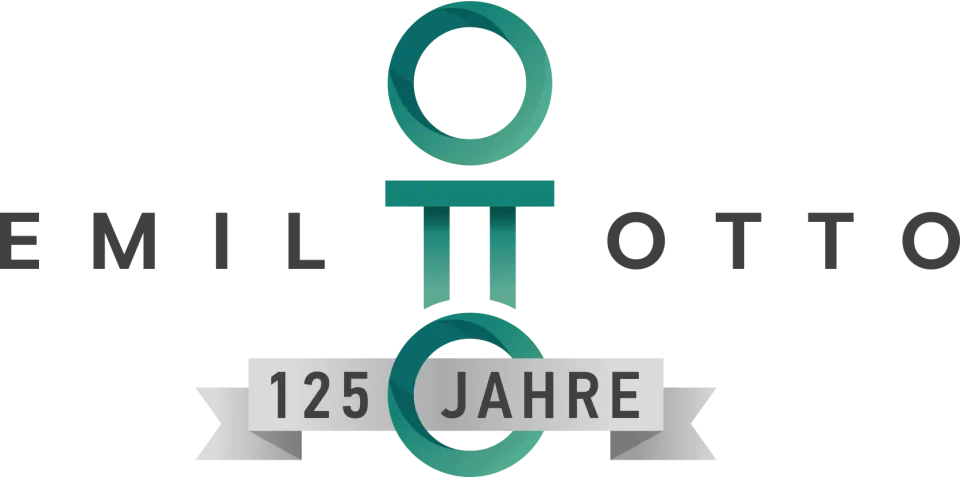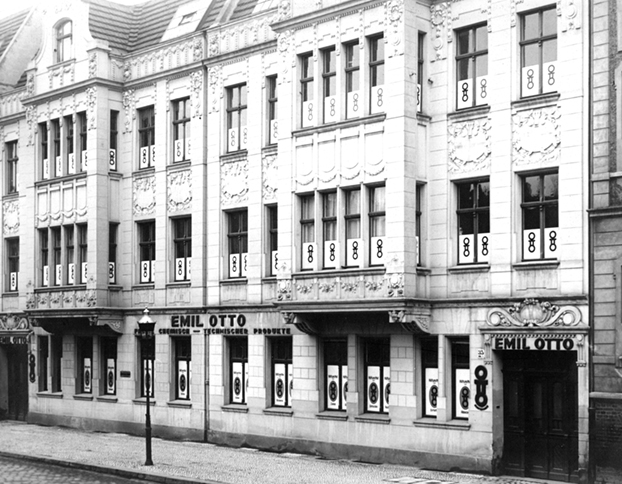"There are probably few medium-sized companies that have a history as closely linked to the political changes of the last 100 years in Germany as that of Emil Otto GmbH," summarizes Markus Geßner, authorized signatory of Emil Otto GmbH, leafing through the company chronicle. Indeed, the company can look back on an eventful past.
The Emil Otto company was founded in Magdeburg in 1901. At the turn of the century, Magdeburg developed into the center of German heavy machinery and plant engineering. Companies such as Krupp-Gruson and Buckau Wolf required chemical additives for industrial metal processing. Drilling oils, pickling and polishing agents as well as fluxes for soft and hard soldering of ferrous materials as well as copper and brass were used. Chemical auxiliaries as process support for the metalworking industry became increasingly important in order to manufacture efficiently and quickly. The Emil Otto company dedicated itself to the production of these consumables and developed and produced a large number of these chemicals. The focus was on fluxes.
The company continued to develop steadily and survived the turmoil of the First and Second World Wars. During a bombing raid on January 16, 1945, the production buildings were badly damaged, so that production had to continue provisionally in the cellars. After the war, the production facilities were rebuilt so that production could be resumed quickly.
In 1957, the company was converted into a semi-state limited partnership by law. This step affected almost all companies in the former GDR. As a result, the management decided to establish a branch office in Hamburg. The division of the company was cemented when the Berlin Wall was built in 1961. The personal shareholders of the company from the founding family left the former GDR for good and went to Hamburg.
In 1961, the partners acquired the current site in Erbach (Eltville) and converted the premises previously used as a canning factory into a chemical production facility. The Emil Otto company had thus found its new location and supplied the German market with chemical products. In the GDR, Emil Otto KG continued to operate at the Magdeburg site with 50% private and 50% state capital.
In 1972, a law was passed in the GDR to transform medium-sized industry into state-owned enterprises (VEB). The private shareholders were paid out and lost their shares. Emil Otto KG became the VEB Löt- und Poliermittelwerk. In addition to the main site in Magdeburger Maxim-Gorki-Straße, a second site was established in Berliner Chaussee. The VEB Löt- und Poliermittelwerk was supervised in some central tasks, such as application research, quality assurance, central library, etc. by the VEB Härtol.
With the fall of the Berlin Wall in 1989 and the subsequent reunification of the two German states, the Härtol combine was unbundled by the company management and the formerly independent companies were offered to the former shareholders for takeover via the Treuhandanstalt. The owner families took over the Emil Otto company as a retransfer community with the respective shares of the former shareholder structure retroactively to January 1, 1991. The retransfer community as landowner was organized as a GbR.
EMOPOL Flux- und Oberflächentechnik GmbH was founded at the Magdeburg site. The new company was under the management of Mr. Leitreuter, the managing director of Emil Otto GmbH and the shareholder Dr. Herzog. After the death of Dr. Herzog, Mr. Leitreuter began to unbundle the business unit, which was managed as a community of heirs, and to transfer it completely into his ownership. The GmbH was liquidated and assigned to Emil Otto e.K. as a business unit. The Emil Otto company managed by Mr. Leitreuter, with its headquarters in Eltville/OT Erbach and the branch in Magdeburg, reappeared as a single entity for the first time.
In the course of development, the focus of development and production increasingly shifted from the classic ranges of polishing and soldering technology to fluxes for the electronics industry. Starting in the 1970s, Emil Otto GmbH continued to develop its products to keep pace with the ongoing developments in the electronics industry. The process of wave soldering was accompanied from the very beginning by the changeover to lead-free soldering processes, New environmental trends such as water-based fluxes and the development of selective soldering processes on a larger scale were not only accompanied, but actively shaped.
Due to a serious illness, Mr. Leitreuter was no longer able to perform his duties to the full extent in recent years. He reorganized the company and, by founding Emil Otto GmbH, created the opportunity to take the business out of the partnership. After his death, the Geßner couple took over the company in 2014. Due to the many restructuring measures of the last 20 years, urgent investments in the sales development of the products were now necessary.
"We took over Emil Otto in an extremely difficult situation," says Barbara Geßner, Managing Director of Emil Otto GmbH, looking back. In addition to rebuilding the marketing and sales structures, the entire product range was also streamlined and adapted to the current needs of the electronics industry. The first trade fair activities were carried out in 2015. Emil Otto GmbH was freed from its slumber and brought back into the limelight of the specialist public. New products, such as cleaning media and SMD adhesives, were added to the product portfolio. Partnerships with KiWo and other manufacturers were also entered into in order to put the company on a broader footing.
Markus Geßner confirms that the company will continue along this path. "We will continue to actively pursue this path in the future and focus on customer needs. We will continue to work on optimizing our product range. We will be presenting further innovative products at the SMT in April 2016. The sales network will continue to be actively expanded and optimized. Talks are being held with potential sales and cooperation partners so that the market can expect many new products from Emil Otto in the near future," summarizes Geßner.
Emil Otto GmbH will also be taking new steps in another area. "In addition to the electronics industry, we also have products for toolmaking and mechanical engineering, for hard and soft soldering as well as for radiator construction and strip tinning. In recent years, these industries have not been given any marketing attention and we want to bring them back into the focus of users. Until now, these high-quality products have only been known to a small circle of experts and hardly any customers are aware of Emil Otto's complete range. This will change from 2016. In future, these product groups will also be made known to a broad public and actively presented," explains Geßner.
The history of Emil Otto GmbH continues to unfold. "I think the company has been through a lot over the last few decades. But what has always endured is the awareness of delivering the highest quality. As the new management, we have also committed ourselves to this awareness, because tradition is not about resting on our laurels, tradition must be lived and continued. We are convinced that Emil Otto GmbH is heading for successful times," says Barbara Geßner, looking optimistically to the future.
*****
The name "Emil Otto" has stood for the highest quality since 1901. As an owner-managed company in its fifth generation, Emil Otto has dedicated itself to the development and manufacture of high-quality products for metal surface treatment and metal joining technology. In particular, the fluxes for electronics production, strip tinning, radiator construction and galvanizing are used by market leaders at home and abroad.
Reliable products and a high level of customer orientation have become the company's hallmark over the years. Production is carried out according to the latest standards and the quality and environmental management has been certified for many years. Emil Otto fulfills all customer specifications and responds flexibly to customer requests. Special products or product adaptations are developed and implemented in cooperation with plant manufacturers and institutes.

